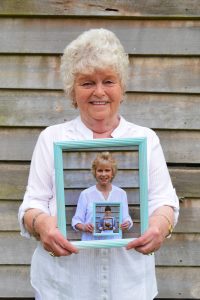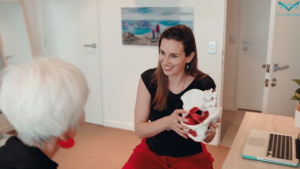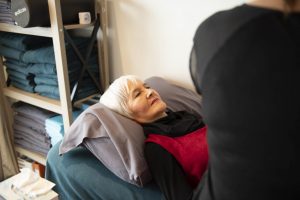25th February, 2020
Top tips to beat menopause! Emphasise the PAUSE in menopause.
Menopause top tips!
Menopause is an important time of your life. Every woman going through menopause should take this opportunity to book in with a pelvic health physiotherapist who can help you make this experience more fab than sad! Book in today and help us to help you.
Your grandmother and the media will have you believe that perimenopause and menopause is the pits. Hot flushes, night sweats, ovary reactions, I mean, over reactions, leaking, plummeting libido, vaginal dryness, insomnia, fatigue. I mean really, what a reputation!
However, when scanning other cultures around the world, it’s really interesting to note that symptoms of menopause can differ drastically and in some cases, are so mild as to not elicit complaint. This isn’t to say the biology or biomechanics of these women are different; they still experience the same downshifts in hormones just like us over in the western camp. But their reactions or symptoms are often different and are attributed to a vast swathe of reasons, including diet, perception, lifestyle, and accrued stress and its management.
Could there be ways to navigate the waters of menopause, so your seas are more mill pond smooth and less cyclone Sally? We reckon there could be a few places to start. Let’s get fishin’.
What is perimenopause and menopause?
Perimenopause means “around menopause”, generally starting on average for most women around age 35 and lasting until menopause.
Menopause is a woman’s last bleed, where the body draws the line in the sand and waves ciao oh so cheerily to any chance of baby making. Buh-bye! For New Zealand women, the average age of menopause is 51.

During perimenopause, our hormones start to do an interesting jive around the body, tap dancing their way through an undulating pattern. When supported with the right diet, exercise, sleep and stress management, there is the potential that you won’t experience any adverse symptoms. Things tend to then amp up during menopause, when declining sex hormones, including oestrogen, progesterone and testosterone, simmer down to a very low level.
What does this actually mean?
These hormones are responsible for tissue elasticity, including vaginal tissue. The little suckers also preserve bone and muscle mass, while maintaining vaginal blood flow and lubrication and contributing to your libido. So, when they start to bugger off, we can experience symptoms around these things.
Menopause and the pelvic floor
The changes in the collagen and elastin within the body’s tissue during menopause can in particular affect the structural and functional integrity of the pelvic floor. This can mean a weakening of the fascia and connective tissues supporting the pelvic organs = the potential for prolapse and incontinence.
Is this common? Yes. Is this normal? Hell no.
Just because you’ve gone through menopause, does not mean you have to suck it up and deal with symptoms which can drastically affect your life. Leaking is NOT normal and it’s NOT something you’ve got to put up with!
At Pelvic Solutions, we love to work with women to get back the freedom and joy of pre-childbirth and menopause life. During our consults, we can work with you to get your pelvic floor muscles active and engaging in the right way, with exercises you can do at home to get the blood flowing and the muscles firing. Yeeha!
Let’s talk about sex, baby
So, you’re sailing through menopause like the fabulous goddess you are, and you’re noticing that things are a little drier down there. As your hormones are changing, the tissues of the vaginal walls can become thinner and less lubrication is produced. It’s important to come in for a check-up with us during this time to make sure the train is on the right track when it comes to your pelvic floor. To get things a little juicer, you can turn to a quality, oil based lubricant which can help put the ‘oh’ back in your love making. We stock some fabulous lubes in clinic, including the brands Olive Oil, Silk and UberLube.
Thanks to the gradual loss of oestrogen and testosterone during menopause, sexual arousal and desire can go out the window. Come backkkkkkkk. It’s important here not to compare yourself to your lady friends when catching up for coffee; every woman’s libido is different and it is dependent on a number factors including hot flushes, vaginal dryness, anti-depressants and stress and anxiety levels.
What can we do?
- Decrease your stress and anxiety levels. This is a biggie. By allowing your body to come into the parasympathetic nervous system, your rest and digest state, you are far more likely to increase your sexual desire. You can do this through breathing techniques, meditation, mindfulness and rest! Hello, you sexy nap you!

- Make sex a priority in your relationship. Without regular intercourse, the vaginal tissue becomes smaller and tighter and it can become painful and uncomfortable. Nobody got time for that.
- Focus on intimacy and your relationship. Kissing and spending time together romantically can help to improve sexual desire.
- Good communication between you and your partner will help you achieve your sexual needs.
- Speak to your GP or Specialist about the use of Hormone Replacement Therapy and Vaginal Oestrogen Supplements to see if they are appropriate for your needs.
- Seek help from a counsellor, sex therapist or psychologist if you continue to have difficulties with arousal. Help is available, you’re worthy and you’re not alone.
What to do when the menopause train rattles into the station?
Chill out
Consider this your permission slip to REST, or the clinical term, STOP, DROP AND FLOP. Let’s emphasise the PAUSE in menopause. Give yourself the time to listen to your symptoms. Research has found that psychological factors such as anxiety, stress, thoughts and beliefs and self-esteem influence the experience of hot flushes. It’s time to give yourself the most precious of all resources; time. Time to reflect, to get to that Yin Yoga class, to take a nap, to say no. We’re all about the JOMO (Joy of Missing Out) rather than the FOMO (Fear of Missing Out).

Exercise (and also, sexercise!)
When you’re looking at your exercise routine when it comes to menopause, we want to include anything that builds and maintains myofascial, bone and muscle strength, mobility, balance, speed, agility, and midlife mind-set. If you’re thinking that sounds like it covers all sports and activities, BINGO! Basically, the exercise that is right for you should be targeted to you should be pain free, leak free and most of all enjoyable!
During menopause, the loss of oestrogen accelerates bone loss (In the first five years after menopause, most women will have lost around 10% of their bone mass. Damn!) which increases the woman’s likelihood of developing osteoporosis; a medical condition that affects the bones, making them brittle and fragile, and more prone to fractures.
Performing correct exercises will help prevent bone density loss, reduce the risk of cardiovascular disease, strengthen the pelvic floor and protect the pelvic organs for the future.
If you are struggling to find the exercise that is right for you, come and see our team for a bespoke exercise program.

Food, glorious food
Getting the right micronutrients and correct, guided supplementation can make an enormous difference to your experience of perimenopause and menopause. Working with a professional, such as a nutritionist or a naturopath, is a fabulous way to get the support and guidance you need for this new stage of life.
Mind-set
It’s time to turn around the idea of menopause as a period of doom and gloom. For many cultures, menopause is a time to look forward to; when women enter their era of wisdom, leading theircommunities from the front. Mind-set is everything and you have the choice to how you see this inevitable time of your life. How do you want to experience it?




